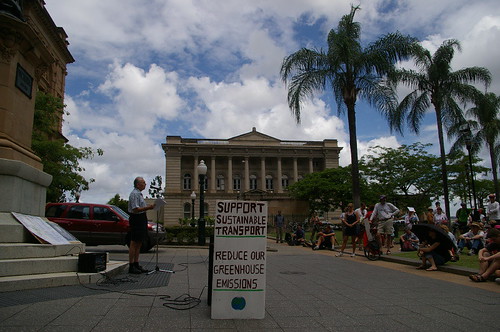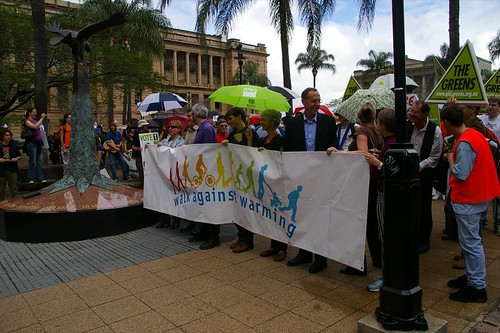Feb. 9 2007
From The New Standard.
While the US government and some corporations are finally acknowledging global climate change, some critics say partnering with such forces may “tame” the movement’s goals and strategies.
The heat is on environmental groups and politicians to churn out proposals for stabilizing the planet’s rising temperatures, but some environmentalists say existing plans to cool climate change are timid. Their criticism reveals a rift between two approaches: preserving the American way of life at the expense of quicker solutions, or changing the structure of US society to counter an unprecedented threat.
The dominant approach to human-induced global warming revolves around slow but dramatic reductions in greenhouse-gas emissions by mid-century. The mainstream environmental community, along with a handful of politicians and corporations, is calling for various regulations and market-based actions to reduce greenhouse-gas output by 60 to 80 percent over the next 43 years.
This goal is based on what some scientists have estimated the United States needs to do to help the world limit the rise in global temperatures to less than two degrees Celsius above pre-industrial levels. The goal presupposes that some climate change is inevitable. In 2006, a government-commissioned report in the United Kingdom called the "Stern Review" said that the "worst impacts of climate change can be substantially reduced" by cutting greenhouse emissions to meet the two-degree goal.
Even if climate warming is kept to two-degrees or lower, the report said there will still be "serious impacts" on "human life and on the environment." For instance, the report predicted the disappearance of drinking water in the South American Andes and parts of Southern African and the Mediterranean, up to 10 million people affected by yearly coastal flooding, and 10 to 40 percent of species on Earth going extinct.
Noting that "2050 is a long time away," David Morris, vice president of the Institute for Local Self-Reliance, said he wants to see action right away. "So what I want to know is, what are [environmental groups and politicians] going to do tomorrow?"
Morris and others who want to see more-immediate and deeper action fear such incremental changes are downplaying the urgency of the situation. "They’re really holding the whole movement back by setting their sights so low," said Brian Tokar, Biotechnology Project director at the Institute for Social Ecology in Vermont.
Market-based solutions
The basic premise behind long-term plans for emissions reduction is that moving away from a fossil-fuel-based energy system will take time because market forces will take a while to make renewable technology prices competitive.
"It’s still possible that we can avoid dangerous climate change and cut emissions in half by mid-century through a process that doesn’t require an immediate shutdown of all of our coal-powered plants," said John Coequyt, Greenpeace energy policy analyst. "We can still do this in a phased – and as a result – economically beneficial manner."
In January, Greenpeace published what it called a "blueprint for solving global warming." The plan calls for 80 percent of electricity to be produced from renewable energy, 72 percent less carbon dioxide emissions, and for the US’s oil use to be cut in half – all by 2050.
The timeline is based on removing the market barriers to green energy, while making dirty energy more expensive. It does not call for significant public funding of renewable energy or government investments in new energy infrastructure or public transportation.
Tokar dismissed the 2050 timeline, saying the US could cut greenhouse-gas emissions more quickly if pressure groups took a different stance and instead called for immediate government intervention.
"The only thing that can change it is a significant investment in public funds to really jumpstart the industry," Tokar said. "There’s no reason we can’t get there within the next five to ten years with significant funding."
Coequyt of Greenpeace agreed with Tokar that the United States could reach emissions-reduction goals sooner if not for the perceived need to depend primarily on the market to make renewable energy the best choice for consumers. "That’s definitely the case; we could see faster action," Coequyt said. "It’s hard for us to be a lot faster than what we put in our scenario, but if the government made it a true national priority, I don’t think there’s any doubt that we could go faster."
Despite this admission, Greenpeace is not pushing for the government to get heavily involved in funding and distributing renewable energy, but instead promotes weaker reforms like removing subsidies for fossil-fuel industries and forcing prices to reflect the actual costs of environmental damage. To reduce market barriers faced by clean-energy technology, Greenpeace advocates offering producers of sustainable power priority access to the electricity grid and reducing the governmental red tape that inhibits their startup.
What would be the other option?" asked Coequyt. "Mandate that every house has to have solar panels on it and that coal plants have to shut down?"
According to Tokar, Greenpeace and other groups should be calling for the funding of public transportation and subsidies to make housing more energy efficient. "We can do all of these things immediately," he said.
Dissidents also rebuke the mainstream environmental community for not pushing hard for a less-energy-intensive lifestyle in the United States.
Coequyt acknowledged Greenpeace is not yet urging Americans to fundamentally change the way they live to fight climate change. "What we’re saying right now is that we have the technology, and we can reduce our energy through efficiency use so much, and we can do it without having to completely change our lifestyle," he said. "But it is certainly possible that in the near future we may have to have a more-urgent call."
But for some environmentalists, making the urgent call for lifestyle changes – from something as tame as driving less to more radical changes like adopting a vegetarian, localized diet – should go hand in hand with the push for larger, system-wide greenhouse-gas reductions and energy efficiency. They say radically scaling back consumption is needed to ensure global environmental sustainability and equity.
Mark Hertsgaard, an environmental journalist, told TNS that to avoid "irrevocably cooking" the planet, "we cannot continue this resource-intensive life." Given a rising global population and unmet energy needs of poorer countries, he said: "At the end of the day, we also have to cut back on our appetite. That’s just arithmetic."
Morris, of the Institute for Local Self-Reliance, said environmentalists need to start pushing large-scale changes into the public discourse. "We need to start asking for the kind of sacrifice that will be required," he said.
Political Disconnect
Another plan published by the United States Climate Action Partnership (US-CAP), a coalition of corporations and environmental groups, calls for legislation to rapidly enact a "mandatory emission-reduction pathway," with an ultimate goal of 60 to 80 percent carbon reductions by 2050.
The partnership includes the Natural Resources Defense Council, Environmental Defense, the Pew Center on Global Climate Change and the World Resources Institute. They are joined by nine corporations – including DuPont, BP America and General Electric.
Vicki Arroyo, who is with the Pew Center, said their proposal is "ambitious."
But, Arroyo said, the plan "can’t start today" because passing legislation takes time. "There really is no way in our system to move any faster than what’s being recommended here," Arroyo told TNS.
Many of the proposals reflect the need to court the Bush administration and politicians, who have refused to call for tough measures on climate change.
Bill McKibben, an environmentalist organizing national demonstrations against climate change with the new "Step It Up" campaign, likened the United States’s stance on global warming to an "ocean liner heading in the other direction entirely." He said, "[Eighty percent reductions by 2050] seems to be at the moment the outer limit of what’s politically possible."
For author and radical environmentalist Derrick Jensen, the obstacles to faster changes presented by the US political system, illustrate the need for more-holistic measures.
"None of [the solutions presented by mainstream groups] address the power structures," Jensen told TNS. "None of them address corporations. None of them address a lack of democracy…. The environmental groups are not questioning this larger mentality that’s killing the planet."
Read the
article.
Read More......





